How and Why to Purchase a Pre-Construction Condo in Toronto

The real estate market in Toronto has been booming in recent years, making it an attractive option for homebuyers and investors alike. Among the various options available, pre-construction condos maintain significant popularity. In this blog post, we will explore the process of purchasing a pre-construction condo in Toronto, as well as the underlying reasons why it can be a wise investment choice.
Understanding Pre-Construction Condos
Before diving into the process of purchasing a pre-construction condo, it’s crucial to understand what it entails. Unlike traditional condos, which are ready for occupancy, pre-construction condos are purchased during the planning phase or before construction begins. Buyers have the opportunity to select units and customize them based on their preferences.
The Benefits of Purchasing a Pre-Construction Condo
Price Advantage
One of the most significant advantages of buying a pre-construction condo in Toronto is the potential for price appreciation. By investing in a project at its initial stage, buyers can benefit from purchasing at a lower price than the market value at the time of completion. This can provide excellent returns on investment in the long run.
Customization Options
With pre-construction condos, buyers have the advantage of selecting layouts, finishes, and fixtures according to their personal preferences. This allows for a personalized touch and the ability to create a space that truly reflects the buyer’s style and needs.

Modern Design and Amenities
Pre-construction condos often offer modern architectural designs and a wide range of amenities that cater to residents’ comfort and lifestyle. These amenities can include fitness centres, swimming pools, rooftop gardens, and even concierge services. Investing in a pre-construction condo allows buyers to access such amenities right from the beginning.
Potential Rental Income
For investors looking to generate passive income, pre-construction condos can be an excellent source of rental income upon completion. Toronto’s high demand for rental properties, coupled with the growing population, makes it an ideal market for property investors.
The Process of Purchasing a Pre-Construction Condo
Research
Start by researching reputable developers and projects that align with your investment goals or lifestyle requirements. Look for developers with a track record of delivering quality projects on time.

Understanding the Floor Plan
Analyze the different floor plans available for the project to find the one that fits your preferences and needs. Consider factors such as square footage, the number of bedrooms, and layout.
Financing
Make sure to assess your financial readiness and explore financing options. Pre-construction condos typically require a deposit structure that spans the construction period. Consult with a mortgage specialist to determine the best financing plan for your situation.
Review the Agreement and Contracts
Before committing, carefully review all documents related to the purchase, including the purchase agreement, condominium guidelines, and any associated costs. Seek legal advice to ensure you fully understand the terms and conditions.
Secure the Unit
Once you’ve done your due diligence and are satisfied with your decision, submit a purchase offer and deposit to secure your desired unit. Be prepared to wait as construction times can vary.

Completion and Occupancy
As the construction progresses, you’ll be notified of the completion date and occupancy details. Prepare for the final closing costs and arrange for a home inspection before taking possession of your unit.
Purchasing a pre-construction condo in Toronto provides numerous benefits, including price advantages, customization options, potential rental income, and access to modern amenities. However, thorough research, understanding of the process, and careful consideration are crucial before making a commitment. By following the outlined steps, you can navigate the journey of purchasing a pre-construction condo and make an informed decision that aligns with your investment goals and lifestyle needs.
Do you have any questions about purchasing a pre-construction condo in Toronto? Connect with BAZIS on social media (Facebook, Twitter or Instagram) and let us know!
Buying Pre-Construction in Toronto: The Top 5 Advantages to Investing

Are you thinking about investing in real estate in Toronto? Toronto is a vibrant city with a booming real estate market, and one of the hottest trends right now is buying pre-construction condos. In this blog post, we’ll dive into the top 5 advantages of investing in pre-construction condos in Toronto, so you can make an informed decision. Let’s get started!
- Lower Purchase Price
One of the biggest advantages of buying a pre-construction condo in Toronto is getting in at a lower purchase price. Developers often offer early-bird incentives to attract buyers, such as discounted prices and special payment plans. By investing early, you can secure a condo at a lower price compared to the market value. This means that as the property appreciates in value during the construction period, you’ll already be one step ahead, ensuring a great return on your investment.
- Potential for High Appreciation
Investing in a pre-construction condo also offers the potential for high appreciation. With Toronto’s hot real estate market, property values have been steadily increasing year after year. By investing in a pre-construction condo, you have the opportunity to ride the wave of appreciation and maximize your returns. As the condo is completed and the demand for housing in Toronto continues to rise, the value of your investment is likely to increase significantly.

- Customization Options
Another advantage of buying a pre-construction condo is the opportunity to customize your unit. Unlike buying a resale condo, where you have limited control over design choices and you might have to undertake costly renovations to make the space feel modern and fresh, pre-construction condos are brand new. Pre-construction condos allow you to work with the developer to select finishes, amenities, and even layout configurations that work best for you and your family’s lifestyle. This level of customization ensures that your condo feels like a unique and personal space that suits your life and preferences. Plus, it can also be a selling point if you decide to rent or sell the property in the future.

4. Modern Amenities, Sustainable Construction, and Smart Home Technology
Pre-construction condos in Toronto often come equipped with all the modern amenities and features that today’s homebuyers desire. These condos may feature luxurious living spaces with state-of-the-art fitness centres and rooftop terraces, attracting buyers and tenants with added value. More and more developers are also prioritizing eco-friendly construction practices, including energy-efficient designs and sustainable materials that go above and beyond the Ontario Building Code, contributing to reduced energy consumption and environmental impact.

Alongside sustainable construction, many pre-construction condos boast smart home technology, offering convenience and sophistication. From integrated home automation systems to energy-saving features, pre-construction condos in Toronto can enhance your lifestyle by allowing you to control the lights, temperature, and security from your smartphone.

- Rental Income Potential
Last but not least, investing in a pre-construction condo opens up the possibility of generating rental income. Toronto is a thriving rental market, and with the city’s growing population, the demand for quality rental properties continues to rise. By purchasing a pre-construction condo, you have the opportunity to become a landlord and generate passive income while building equity. As the property is completed and the condo market remains strong, renting out your unit can provide a consistent stream of income while your investment continues to appreciate over time.

Buying a pre-construction condo in Toronto comes with numerous advantages. Not only can you secure a property at a lower purchase price and potentially enjoy high appreciation, but you also have the opportunity to customize your unit, enjoy modern amenities, and generate rental income. With all these benefits, it’s easy to see why investing in pre-construction condos in Toronto is a smart choice.
So, if you’re considering a real estate investment in Toronto, don’t miss out on the opportunity to invest in a pre-construction condo. Contact our team today to learn more about available projects at BAZIS, and find the perfect pre-construction condo that suits your investment goals and lifestyle. Happy investing!
Do you have any questions about investing in pre-construction condos in Toronto? Connect with BAZIS on social media (Facebook, Twitter or Instagram) and let us know!
Understanding Canada’s New Tax-Free First Home Savings Account (FHSA)

Are you a Canadian dreaming of owning your first home? Saving for a down payment can be a daunting task, but there’s a new option available that can make the process easier. The new First Home Savings Account (FHSA) is a registered plan that allows you to save tax-free for your first home, up to certain limits. Although availability is currently limited and varies by financial institution, many institutions are expected to launch their FHSA later in 2023. In this blog post, we’ll explore everything you need to know about the new FHSA, including why it was created, how it works, how it’s different from the existing RRSP Home Buyers’ Plan (hint: it’s more generous!), and how you can maximize its potential, even if you don’t have immediate plans to buy a home. So, if you’re a Canadian looking to make your dream of home ownership a reality, keep reading!
What is an FHSA?
An FHSA (First Home Savings Account, just to recap) is a registered account announced by the federal government in 2022. It’s designed to help Canadian residents save for their first home tax-free. An FHSA combines some of the features of a Registered Retirement Savings Plan (RRSP) and Tax-Free Savings Account (TFSA). Contributions to an FHSA will generally be tax-deductible, similar to an RRSP. Withdrawals to purchase a qualifying home will be non-taxable, similar to a TFSA or the RRSP Home Buyers’ Plan (more on this later).
Why should I consider opening an FHSA?
Opening an FHSA has several advantages, including:
- Tax benefits: Your FHSA contributions can reduce your taxable income.
- Tax-free growth: Any investment income in your FHSA is non-taxable while it’s in your account.
- Tax-free withdrawals: Pay no taxes on your withdrawals when you use your FHSA toward the purchase of a qualifying home.
- No repayment is necessary: Unlike the RRSP Home Buyers’ Plan, any funds withdrawn to go toward the purchase of a new home do not need to be repaid.
How do I qualify to open an FHSA?
To open an FHSA, you must be a Canadian resident who has reached the age of majority in your province or territory. You must also be an eligible first-time homebuyer who hasn’t lived in a qualifying home in the past four calendar years.
Types of FHSAs
You can hold the same types of investments in an FHSA as in a TFSA or RRSP, including cash, mutual funds, publicly traded securities, government and corporate bonds, and guaranteed investment certificates (GICs). When it comes to FHSAs, there are three different types that can be offered:
- Depositary FHSA: An account with a financial institution that holds money, term deposits, or GICs.
- Trusteed FHSA: A trust with a trust company as trustee that holds qualified investments such as money, term deposits, GICs, government and corporate bonds, mutual funds, and securities listed on a designated stock exchange.
- Insured FHSA: An annuity contract with a licensed annuity provider.
Banks, insurance companies, credit unions, and trust companies can all be FHSA issuers that offer these types of accounts. Additionally, if you prefer to build and manage your investment portfolio by buying and selling different types of qualified investments, you can set up a self-directed FHSA.

How much can I contribute and withdraw from my FHSA?
If you’re considering opening a FHSA, it’s important to understand the rules around contributing and withdrawing funds. The annual contribution limit for an FHSA is $8,000, which includes any transfers you make from an RRSP. You can carry forward any unused portions of your annual contribution limit up to a maximum of $8,000. The lifetime contribution limit for an FHSA is $40,000, and you must use your FHSA contributions within 15 years of opening the account or by the time you turn 71 years old, whichever comes first. After that time, you can transfer your savings into an RRSP or Registered Retirement Income Fund (RRIF) or make a taxable withdrawal. The good news is that there’s no limit for qualifying withdrawals, which means that if you qualify to use your savings toward the purchase of a qualifying home, you can withdraw amounts from your FHSA tax-free. Individuals may claim an income tax deduction for FHSA contributions made within the calendar year or in a previous year, to the extent not previously deducted, and a maximum of $8,000 unused contribution room can carry forward to the following year.
What is a qualifying withdrawal?
If you’re a first-time homebuyer and a resident of Canada, you may be eligible to make a qualifying withdrawal. A “qualifying home” is defined as a housing unit located in Canada, including a share of the capital stock of a cooperative housing corporation. To be eligible, you must have a written agreement to buy or build a qualifying home located in Canada before October 1st of the year following the year of withdrawal. Additionally, you must intend to occupy the qualifying home as your principal place of residence within one year of buying or building it.
What if I don’t end up buying a home?
Funds withdrawn from your FHSA that are not used to purchase a qualifying home are subject to tax. If you find that you have a balance in your FHSA that you’re not using toward a home purchase, you have the option to transfer those funds to an RRSP or RRIF on a non-taxable transfer basis, subject to applicable rules. The great news is that transfers from your FHSA to your RRSP or RRIF do not impact your available RRSP contribution room. It’s important to note, however, that the funds transferred to an RRSP or RRIF will be taxed upon withdrawal. So, if you’re not planning on using your FHSA savings toward a home purchase, transferring the funds to an RRSP or RRIF could be a smart move to avoid paying taxes on the balance.
Can I transfer funds from my RRSP to an FHSA?
It’s possible to transfer money from your RRSP to your FHSA without paying taxes. However, there are annual and lifetime contribution limits for these transfers, and they cannot be claimed as a deduction from your income. It’s important to note that transferring funds from an RRSP to an FHSA will not increase your RRSP contribution room. Additionally, it’s not currently possible to transfer assets in-kind to your FHSA.

What’s the difference between an FHSA and the existing RRSP Home Buyers’ Plan?
Under the current Home Buyers’ Plan, Canadians who meet eligibility requirements and conditions can withdraw a maximum of $35,000 from their RRSP to go toward the purchase of a first-time home. They must then repay the amount over a period of 15 years. However, an FHSA works differently, in that there is no requirement to repay the funds withdrawn from the account. As well, you’re able to contribute and withdraw up to $40,000 (versus $35,000). However, only $8,000 per year can be contributed, whereas with the RRSP Home Buyers’ Plan, the amount you can contribute annually depends on your income and your personal available contribution room.
Can I use both the FHSA and the Home Buyers’ Plan to buy my home?
Yes. You can use combined savings from your Home Buyers’ Plan and your FHSA toward the purchase of the same qualifying home.
Are you thinking about opening a First Home Savings Account (FHSA), and if so, do you have any questions? Connect with BAZIS on social media (Facebook, Twitter or Instagram) and let us know!
BAZIS is a real estate development company specializing in developing communities and pre construction condos in Toronto area. We’re committed to excellence in every facet of the commercial and residential real estate development process. Combining visionary architecture, design, marketing and construction with the epitome of corporate integrity and environmental responsibility, BAZIS has become a major force in articulating Toronto’s ever-evolving skyline.
Do New Development Condos in Toronto Allow Airbnb Rentals?

Airbnb is a popular accommodation option for travellers in Toronto. It’s estimated that there are over 8,000 listings on the site, and this number continues to grow each year. As an Airbnb host, there are many benefits to listing your property on the site. It’s a great option, for example, if you’re looking for a change in careers, trying to make passive income, wanting to become your own boss, or looking to rent out your home while you travel or are away for work. It sounds great if you already own a property, but what if you’re in the market for a new condo? Do new development condos in Toronto allow Airbnb rentals? Read on to find out more.
What Is Airbnb?
Airbnb is a website that connects people who have extra space in their homes with people who want to stay there. Airbnb hosts rent out their private rooms or entire homes, often at lower rates than hotels and other lodging options. Airbnb has become popular in recent years because it allows users to travel more affordably while getting a unique experience staying in someone else’s home.
Know the Regulations
The impact of Airbnb on new development condos is one that should be considered by developers and homebuyers alike. The rise in popularity of short-term rentals has resulted in a decrease in available long-term rental units, as well as an increase in competition for available units. While the city continues to grapple with an affordable housing crisis, the City of Toronto amended their short-term rental rules and regulations in November 2019 to dissuade investors from purchasing properties for the use of short-term rentals alone. The new short-term rental rules are such that you can short-term rent your home only if it’s your principal residence. This is the residence where you live and the address you use for bills, identification, taxes and insurance. You can only have one principal residence at a time, so therefore you cannot legally run more than one short-term rental. You can rent up to three bedrooms in your principal residence for an unlimited number of nights per year or the entire home for a maximum of 180 nights per year. Your home must be in a residential area in the city, and you must be registered with the City.

Do New Development Condos Allow Airbnb Rentals?
The short answer is that it depends.
Because of the new rules and regulations, you can only operate an Airbnb out of your principal residence, meaning it’s not a viable option for condo investors who are interested in purchasing property for the sole purpose of renting it out as a short-term rental. That being said, if your plan is to live in your unit and rent it out under the new short-term rental rules and regulations, then there are a number of factors to consider before buying into a pre-construction condo.
One of the most important considerations is whether or not Airbnb rentals are allowed in the building. The restrictions on Airbnb rentals vary from condo to condo, and range from no restrictions at all (for example, some buildings allow short-term rentals year-round) to very few nights allowed per year (for example, only one weeknight per month) to none permitted at all. Condo boards can also place restrictions based on unit type or floor level; for example, some buildings allow only penthouse owners to rent out their units as short-term rentals while others allow any owner who lives in their unit full-time to do so.
Before purchasing a property for short-term rentals such as Airbnb, it’s important to check the preliminary bylaws and ensure that they permit this type of rental. However, it’s worth noting that some developments may prohibit short-term rentals once residents move in. In certain situations, it may be possible to persuade the developer to include grandfather clauses for short-term rentals. Nevertheless, it’s advisable to consult a real estate lawyer before making any decisions.
If you’re looking to rent out your condo on Airbnb, there are a few things you should keep in mind. Make sure that the building allows short-term rentals and has an agreement with Airbnb or another service like it. Many buildings have restrictions against short-term rentals because they want to maintain a sense of community among residents and discourage transient use by people who may not be invested in the building’s success. If you’re considering renting out your unit through Airbnb, ask about these policies before making any decisions about whether or not it’s right for you.
Do you have any questions about new development condos and Airbnb? Connect with BAZIS on social media (Facebook, Twitter or Instagram) and let us know!
Making a Smart Investment: Comparing Pre-Construction Condos and Resale Properties

The Toronto real estate market is always evolving, and as a potential homebuyer, it can be challenging to decide which type of condo to invest in. While resale properties offer established communities and a record of previous sales, pre-construction condos promise the latest in modern design and technology, often stellar locations, and many other benefits. In this blog, we’ll explore the pros and cons of each option to help you decide which type of condo is the right investment for you.

Pre-Construction Condos
Pre-construction condos are properties that are still in the planning and construction phase, as the name suggests. These units offer buyers the opportunity to enter the real estate market at a more gradual pace, as the buyer typically pays a deposit of 5-15% over a period of time, with the remaining down payment due at the completion date, which is typically about 2-5 years later.
Pre-construction condos usually feature the latest advancements in modern design and technology, making them appealing to prospective buyers or renters. Furthermore, these condos are usually situated in emerging neighbourhoods, which can lead to higher appreciation potential over time as the area becomes more desirable. Many condos are also built in prime locations, however, to help intensify cities.
Investing in a pre-construction condo has several significant advantages. Firstly, buyers can secure the property at the lowest price without having to participate in bidding wars. Additionally, buyers can customize the unit according to their preferences, such as choosing the appliances, finishes, and layout that best serve their needs. Furthermore, pre-construction condos come with warranties, which can provide reassurance in case of any unforeseen issues.

Despite their benefits, pre-construction condos present their own set of challenges. One potential challenge is the risk of construction delays, which can affect your ability to move in, generate rental income, or sell the unit. Since pre-construction condos require time to build, you must have a good understanding of what your future might look like in a few years. For example, how much space will you need? Are you planning to expand your family? Additionally, since pre-construction condos are not yet constructed, you cannot inspect the unit before purchasing, which can be a disadvantage for those who prefer to see the space before making a decision.

Resale Properties
Resale properties are homes that have been previously owned and are now being sold by their current owner. These condos are typically located in established communities, offering a sense of stability and history. Resale properties are oftentimes larger than pre-construction condos, offering more space for families or those looking for a little extra room.
One of the primary advantages of investing in a resale is the ability to see the property before you buy. This means that you can inspect the home for any potential issues and get a feel for the space and layout. You can also research the property’s history, including previous sales and any issues that may have arisen.
Another benefit of investing in a resale property is the ability to move in right away and the potential for immediate rental income. Since these units are already built and ready to occupy, you can start renting them out right away. This can help you earn a return on your investment more quickly than waiting for a pre-construction unit to be completed.
Despite their benefits, resale homes present their own unique challenges. One of the main concerns is the age of the property, which may require more frequent maintenance and repairs. Additionally, since these properties have already been owned, they are not as customizable and may not feature the latest advancements in modern design and technology. This can have an impact on the property’s appeal to potential tenants or buyers. Furthermore, purchasing a resale property typically requires a significant amount of money upfront, as the down payment is usually around 20% of the property’s value.

Which Type of Condo Should You Invest In?
When choosing which type of condo to invest in, it’s crucial to consider your objectives, preferences, and financial position. If you want immediate rental income, quick occupancy, or a sense of community, a resale property may be the better option. However, if you’re searching for a new unit that you can tailor to your liking and the potential for appreciation over time, a pre-construction condo might be more suitable. You must also assess your finances and determine which option is most suitable for you. Can you afford a down payment of 20% or more right now, or do you need some time to make your payments?

Additionally, the location of the unit is critical to consider since it can influence its appeal and potential for rental income and appreciation over time. Seek out units situated in sought-after neighbourhoods with convenient access to public transit, shopping, and entertainment options.
Ultimately, the decision of whether to invest in a resale or pre-construction condo comes down to your personal goals and preferences. Do your research, weigh the pros and cons of each option, and make an informed decision that aligns with your investment strategy.
Do you have any questions about resale or pre-construction condos? Connect with BAZIS on social media (Facebook, Twitter or Instagram) and let us know!
The Most Common Mistakes of Pre-Construction Condo Buyers
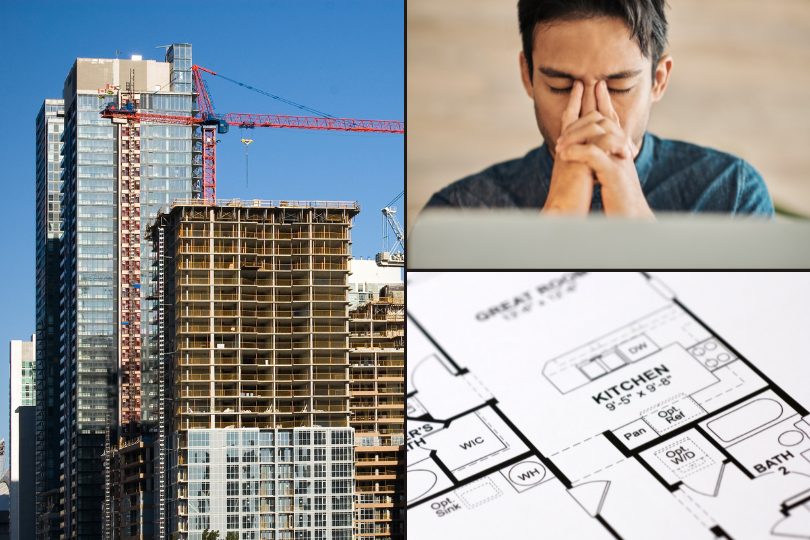
Buying a pre-construction condo in downtown Toronto in 2023 can be an exciting opportunity. Investing in a pre-construction condo in Toronto gives you access to the best units at the lowest pricing, not to mention a brand new home that you get to customize to your liking! Pair that with an excellent neighbourhood and a reputable builder, and you’ve got yourself a slam-dunk. Purchasing a pre-construction condo is not only a great life choice, but also a lucrative investment if you choose to rent or sell later.
While the rewards are plenty, it’s essential to proceed with caution when investing in a pre-construction condo in Toronto. The process can be long and confusing, and if you don’t take care you can end up paying for it with your wallet or your sanity (or both!). We’ve put together a list of the most common mistakes of pre-construction condo buyers so that you can be empowered when making your purchase and enjoy the experience from start to finish.
Mistake #1: Not Getting Professional Advice
One of the biggest mistakes pre-construction condo buyers make is trying to cut costs and navigate the buying process alone. The process of buying a pre-construction condo in Toronto is complex. Before signing any legally-binding contracts, you’ll want to consult an experienced real estate agent, lawyer, and mortgage broker. There are many details to iron out before making major life decisions. These professionals can help you navigate your rights and responsibilities as a condo owner by helping you understand the terms and conditions of your contract. Additionally, they can advise you on the legal aspects of your purchase agreement and your financing options. They’ll also be able to spot any red flags or concerns on your behalf, and ensure that everything goes smoothly and that there are no surprises.
Mistake #2: Not Having a Pre-Approved Mortgage
One of the biggest blunders of purchasing a pre-construction condo in Toronto is when buyers make the assumption that they’ll qualify for a mortgage. Most pre-construction condo projects take years to complete, and your life circumstances can drastically change in that time. You may be eligible for a mortgage now but that might not be the case down the road. Before closing your deal, get in touch with a mortgage broker and make sure you qualify for a pre-approved mortgage.
Mistake #3: Not Planning for Closing Costs and Other Fees
Buying a pre-construction condo requires a considerable amount of financial planning. Many condo buyers look at the price tag without realizing that they’ll also be required to pay additional fees – for example land transfer taxes, registration fees, and legal fees. If you’re not prepared, these costs can quickly add up and become overwhelming. So, before making any decisions, you’ll want to ensure you’re aware of all the costs related to your pre-construction condo. Consider hiring a real estate broker who can help you understand your deposit structure, maintenance fees, property taxes, and closing costs. You’ll also need to factor in additional costs like the monthly interest rate on your mortgage (which can change over time), insurance fees, utility bills, and parking fees.

Mistake #4: Not Planning for the Future
Buying a pre-construction condo means buying a home that hasn’t been built yet. On average, it takes three to five years for a pre-construction project to be completed, depending on its size and complexity. It’s common for builders to face setbacks and delays in construction, which means that the time to complete the project and occupancy is unpredictable. Many buyers purchase their homes with their current lifestyle in mind, but when it comes to pre-construction condos, you need to consider where you’ll be in a few years. You’ll want to factor in potential life changes that may occur – for example, what if you end up having a child and a one-bedroom condo isn’t enough space? Before signing any contracts, think about your future and plan ahead.
Mistake #5: Expecting the Floor Plans to Stay the Exact Same
Many people fall in love with floor plans and renderings shown in marketing brochures without realizing that things can change. This can lead to disappointment when the finished condo isn’t exactly what they had imagined. It’s important to understand that when purchasing a pre-construction condo, you’re buying into the builder’s vision before construction begins. During the construction phase, it’s not uncommon for the initial floor plans to change slightly, either to create more space or to accommodate different features. The best way to combat disappointment is to ensure you’re working with a good builder who’s known to deliver quality results, and be ready to work with a flexible floor plan.
Do you have any questions about the pre-construction condo buying process? Connect with BAZIS on social media (Facebook, Twitter or Instagram) and let us know!
BAZIS is a real estate development company specializing in developing communities and pre construction condos in Toronto area. We’re committed to excellence in every facet of the commercial and residential real estate development process. Combining visionary architecture, design, marketing and construction with the epitome of corporate integrity and environmental responsibility, BAZIS has become a major force in articulating Toronto’s ever-evolving skyline.
Buying a Pre-Construction Condo in Downtown Toronto: Do You Have to Pay HST?
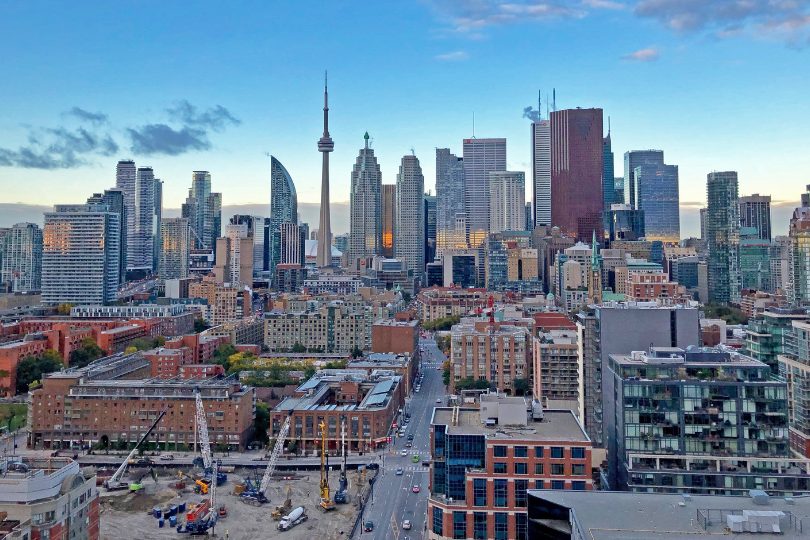
Buying a brand new pre-construction condo in downtown Toronto is exciting, but it may also bring up many questions and uncertainties. It can be confusing trying to understand how HST works, for example, and who pays for it. So, let’s break down HST when purchasing a pre-construction condo in Toronto and take a closer look at the HST Rebate.
In 2010, Ontario implemented Harmonized Sales Tax (HST), which raised the tax on new homes to 13% (HST) – a total of 5% GST (federal taxes) and 8% PST (provincial taxes). To help new homeowners cover the growing costs of owning a new home, the government created the HST Rebate Program. This program works in two ways – depending on what kind of buyer you are – to reimburse buyers for a portion of the tax.
The two ways that buyers can qualify for the HST Rebate in Ontario are:
- HST New Home Rebate (NHR): When you buy a pre-construction condo that you plan to live in (end user)
- New Residential Rental Property Rebate (NRRPR): When you buy a pre-construction condo as an investor with the intent of renting it out after closing (investor)
End Users
When you buy a pre-construction condo in Downtown Toronto, you’re assigning the right to the HST rebate to the builder. The builder then uses the rebate to reduce the purchase cost of the property. This portion of the HST is not added to your property’s purchase price, and the builder will apply for the HST rebate for the property, thus reducing the amount due at closing by the amount of the rebate.
In short: you don’t have to pay for HST on your new condo, as it’s already built into the final purchase price of the home, including the cost of the HST NHR. This is provided you’re a Canadian resident and provided that you, or an immediate family member such as a parent or sibling, plan on being the principal resident of the condo.
One thing to keep in mind is that if you sell or lease the property before the one-year mark, the Canada Revenue Agency (CRA) will require you to pay back the HST Rebate in full.
Investors
If you plan on purchasing a pre-construction condo for sale in Downtown Toronto with the intent of renting it out after closing, you need to apply for the New Residential Rental Property Rebate (NRRPR) rather than the NHR.
To receive the HST Rebate, you need to submit a one-year lease agreement and prove that the property will be rented out for one year after closing. Additionally, you must pay the full HST amount upfront and you will receive the rebate a couple of months after sending in the proof of the lease agreement. Similarly to the NHR, if you end up selling or flipping the property before the one-year mark, the CRA will require that you pay back the HST Rebate in full.

How Much Is the HST Rebate?
The amount of the HST Rebate varies depending on the price of the new condo. If the pre-construction condo is priced under $350,000, then you’re eligible to receive a maximum of $30,000 back (36% rebate on the GST portion, and 75% on PST). Between $350,000 and $450,000, there is a sliding scale, and for properties costing more than $450,000, a maximum rebate of $24,000 can be received.
There are many HST Rebate calculators on the internet that you can consult to calculate the exact amount, but keep in mind that if you’re purchasing a pre-construction condo and plan to live in it, the HST in the majority of cases will already be factored into the purchase price, and you don’t need to worry about it.
Do you have any questions about HST when buying a pre-construction condo in Toronto? Connect with BAZIS on social media (Facebook, Twitter or Instagram) and let us know!
BAZIS is a real estate development company specializing in developing communities and pre construction condos in Toronto area. We’re committed to excellence in every facet of the commercial and residential real estate development process. Combining visionary architecture, design, marketing and construction with the epitome of corporate integrity and environmental responsibility, BAZIS has become a major force in articulating Toronto’s ever-evolving skyline.
How Do Assignments Work When Purchasing a Pre-Construction Condo in Toronto?
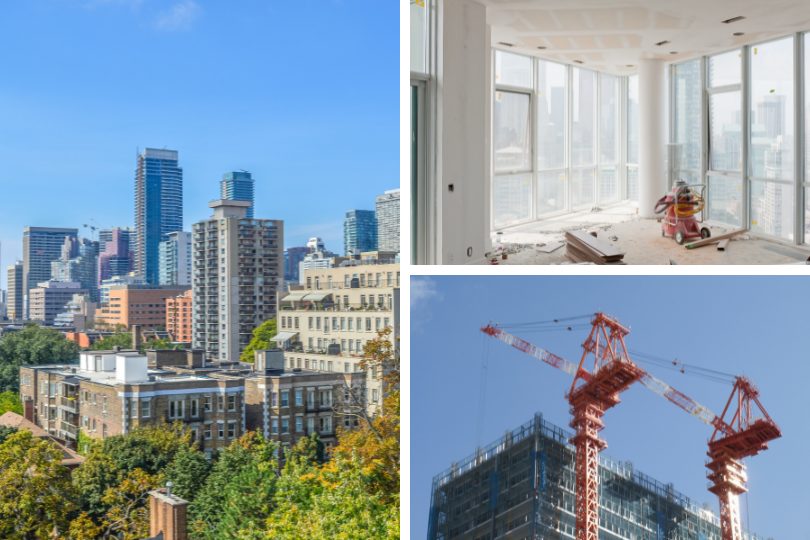
If you’ve purchased a new condo or are in the market to do so, you may have heard the term “assignment sale” and wondered what assignment sales are and how they work. Today, we’re breaking down everything you need to know about assignment sales.
What are assignment sales?
Assignment sales are a type of sale in which a buyer (assignor) sells their condo contract to a buyer (assignee) before the closing (move-in) date. Assignment sales occur for both homes and condos, however are most prevalent in pre-construction condos.

Why do people sell before their closing date?
When purchasing a pre-construction condo in Toronto, there can be a long wait time between the point of purchasing and the actual move-in date. It can sometimes take years before a condo is built and a buyer can move in. During that time, circumstances may change for the buyer. For example, the buyer may have accepted a job offer in another city, they may have gotten married and had kids and need a bigger space, or they may not be able to afford closing anymore. Another reason could be that the buyer bought the condo in an up-and-coming area and is now looking to make a profit on the sale. There are many reasons why a person may want to sell their pre-construction condo to another interested buyer.
How do assignment sales work?
Assignment sales can work in different ways depending on the builder. Some builders don’t permit assignments or allow them only if they are paid an assignment fee. So having the builder’s approval is the first essential step to proceeding with an assignment.
When a buyer makes an assignment sale, what they’re actually selling is the condo contract – not the condo itself, since they don’t actually own it yet (since it hasn’t been closed). They are passing along their contractual agreement with the builder to purchase the home – their right and their obligation.
The buyer purchases this right and obligation, and must abide by all the terms within the original contract with the builder, who is the original seller. The original buyer must sign an Agreement of Purchase and Sale, including an Assignment Agreement Clause.

The pros and cons of assignment sales
To break it down quickly, here are some of the main pros and cons of assignments.
Pros:
- Buyers (assignees) can purchase a brand new condo at a lower price
- The condo’s price/value will likely continue to rise as it’s being constructed
- Buyers can get into an amazing building that sold out
- Buyers benefit from all the perks of the original agreement, such as having their new condo be covered by the Tarion warranty program, which offers years of warranty against errors and defects with the condo unit, as well as provides warranties for newly-installed appliances; the original agreement may also include upgrades, credits, and capped developing charges from the builder
Cons:
- The builder must approve the transaction before it can go ahead
- There’s less ability to negotiate the price of the home, or the terms and conditions of the agreement, since buyers are inheriting the original purchaser’s contract
- Buyers (assignees) will be responsible for closing costs, which can sometimes include the education and development levies, Tarion legal fees, and HST on appliances
- Buyers will also be responsible for paying land transfer tax, municipal levies, legal fees and more
Are you considering investing in a pre-construction condo, and have you considered assignment sales? Connect with BAZIS on social media (Facebook, Twitter or Instagram) and let us know!
Townhomes vs. Condos: Do You Know the Differences?
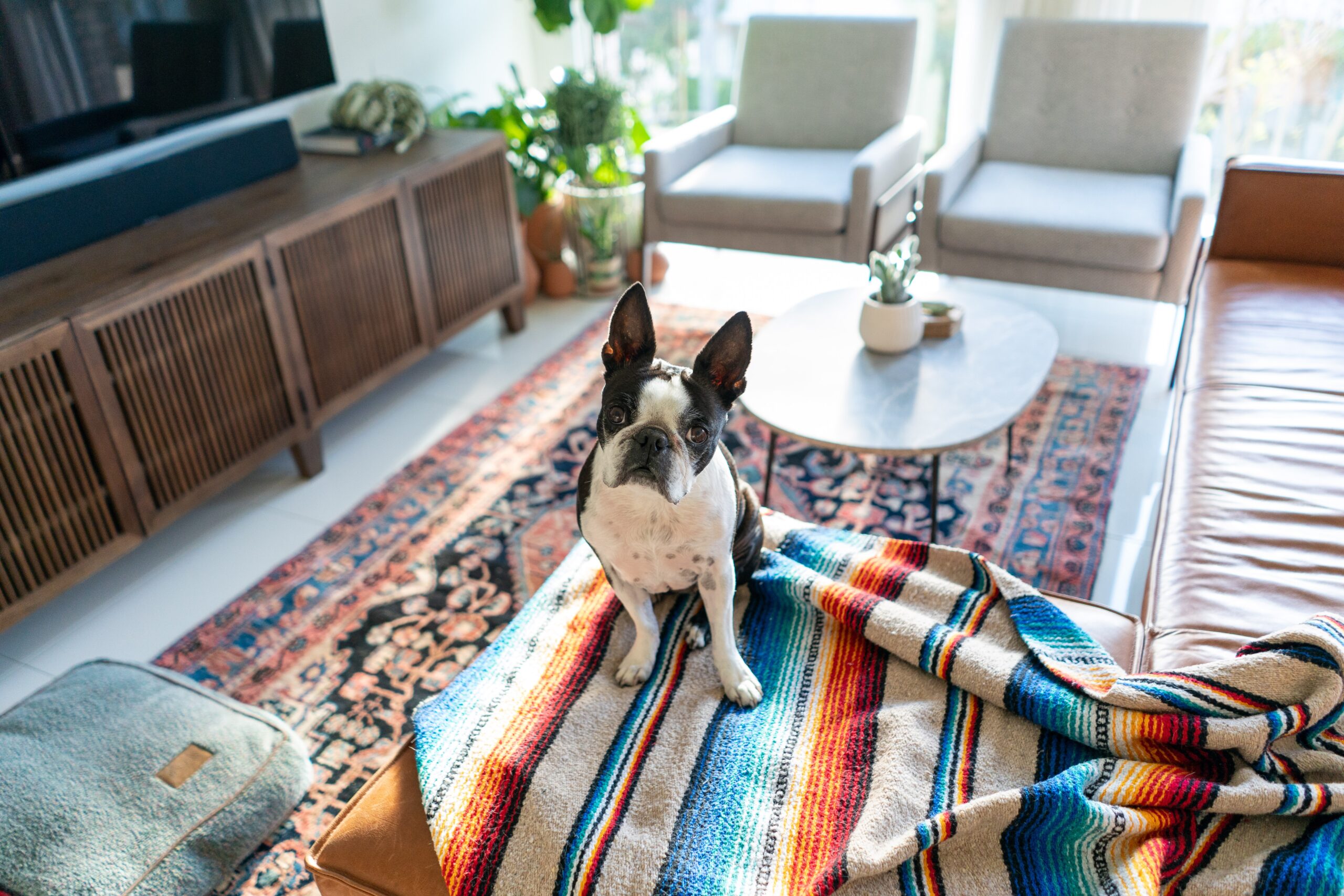
When buying a new home in Toronto or any other urban area, many of the options on the market are either townhomes or condos. These two types of housing often elicit many questions from potential homeowners and bring up many points of confusion, especially when it comes to homeownership and shared/communal spaces. This blog post will break down the differences between townhomes and condos and will help you determine which one is best for you and your family.
First things first. Most people understand that townhomes (or townhouses) are individual houses that are built side by side, with one or two walls of each home being shared with the home next to it, whereas condos are a type of home that are often an apartment within a larger complex or building (although they can take other forms, including townhomes!).
Here are some important differences between these two types of home:
Ownership
With a condo, you own the interior of the residence (your unit) only. Exterior parts of the residence, such as the building itself and the outdoor grounds, as well as communal areas such as gyms, party rooms, and rooftop BBQ areas, are owned by the condo association. Condo associations represent the condo owners and their interests. They’re run and funded by the condo residents and also have boards of directors. The role of the boards is to organize regular meetings, establish and maintain budgets, and enforce rules and regulations relating to the condo. If you’re a condo owner, you, therefore, are a joint owner of the communal and common areas. This means you will have to pay a monthly fee.
New townhomes in Toronto can be either freehold or condominium. If they’re freehold (like our upcoming Bartley Towns community of new luxurious townhomes at Eglinton and the DVP), that means that you fully own the house and also the land on which it is built, as well as any yard or deck surrounding it (similarly to how homeowners of detached homes own their homes and yards outright). Freehold townhomes do not have any monthly maintenance fees.
Condominium townhomes, by contrast, do not include land ownership. Similar to the condo apartments discussed above, residents only own the interior of their home, and the land on which the home is built – as well as the common areas surrounding it, if applicable – are jointly owned amongst all owners. This ownership is again managed through a condo association and involves a monthly fee.
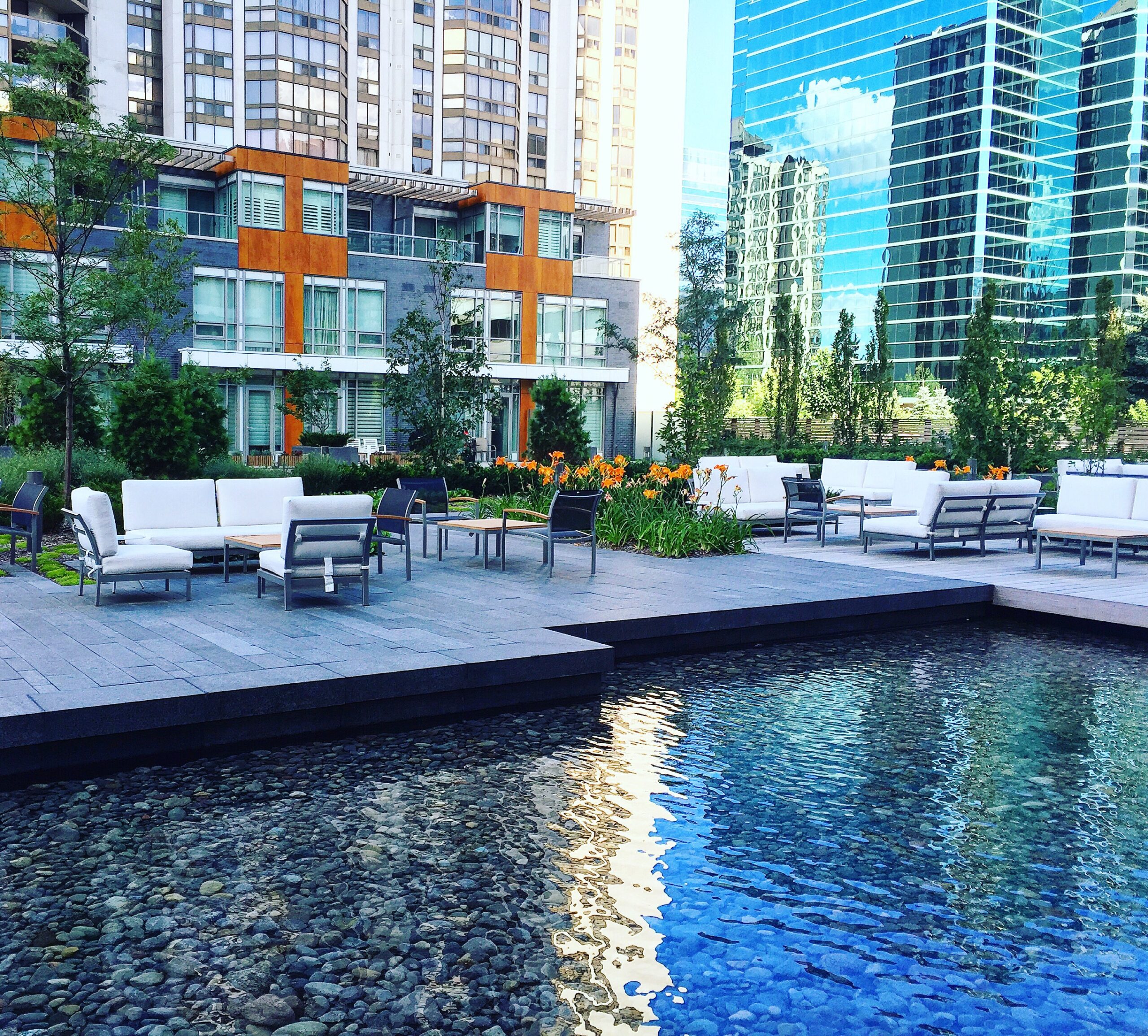
Legal Statutes
Condos are governed by legal statutes, whereas townhomes are not. This means that condo owners have less autonomy since they’re subject to the bylaws outlined by the condo corporation. Residents may not be able to make changes to their homes and may face restrictions regarding the type of exterior decorations they’re allowed to put up, whether or not pets are allowed, rules regarding common areas’ use and open hours, garbage and recycling rules, and also whether or not they’re allowed to rent out their home.
By contrast, owners of freehold townhomes are entirely free to do whatever they like with their homes.
Privacy
Condo owners generally experience a lower level of privacy, especially condo apartments, since they live in close quarters with many other residents and share communal entrances and exits. Owners of new townhomes in Toronto, especially freehold townhomes, are more likely to have a greater sense of autonomy, privacy, and independence.
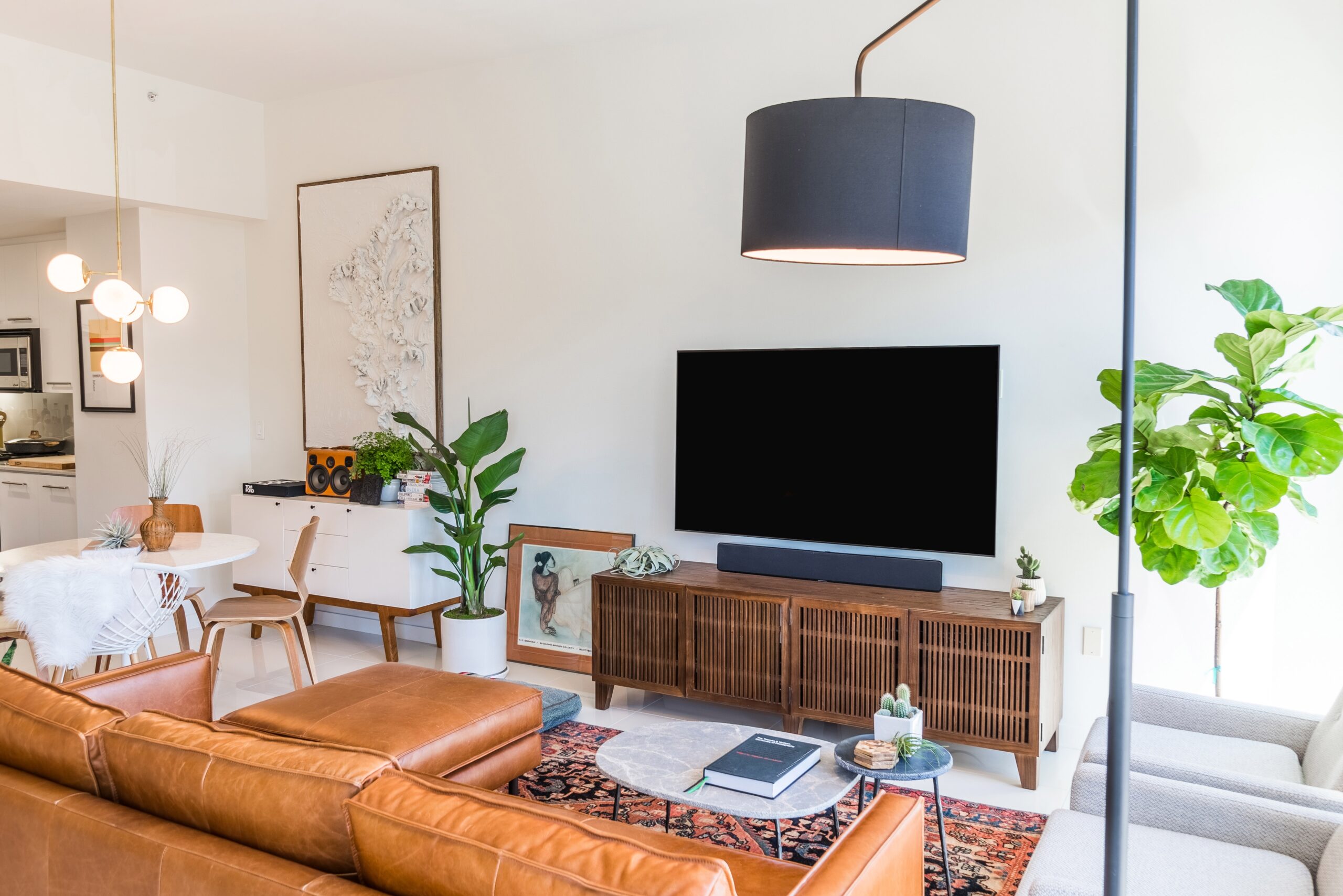
A Summary of the Main Differences
To recap: condo owners only own the inside of their homes, and they’re joint owners of the building’s exterior and communal areas. Townhome owners may have the same situation if the townhome is a condo. For freehold townhomes, however, residents fully own their house and also the land it’s built on and the surrounding yard or deck. Freehold townhomes do not have maintenance fees, while condos do. Condos are governed by legal statutes, whereas townhomes aren’t. This means that owners of freehold townhomes have more autonomy. Lastly, people who live in freehold townhomes generally experience a greater degree of privacy and independence.
Questions? Get in touch by sending us a direct message on social media (Facebook, Twitter, or Instagram) or contact us at 905-532-0435. And make sure to register for our upcoming Bartley Towns community if you’ve decided that townhome living is right for you!
